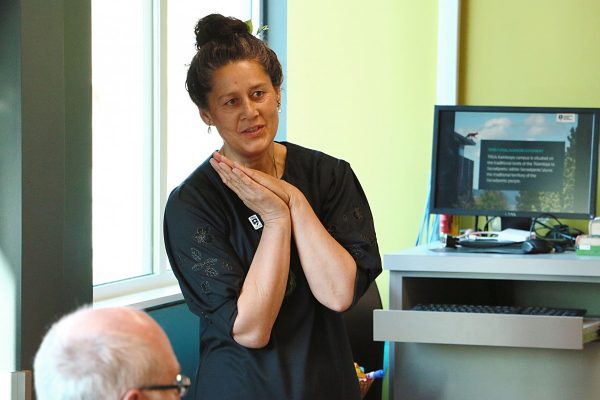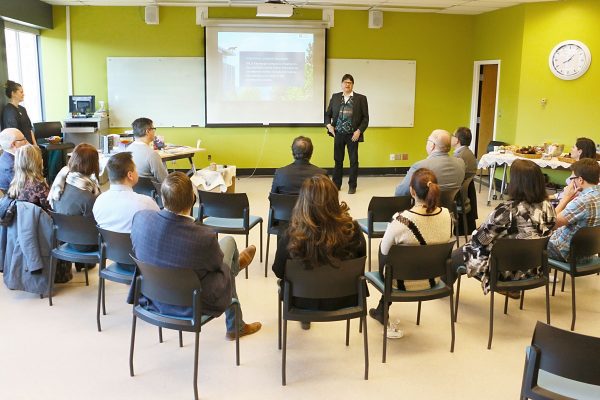TRU strives to close the gap for Indigenous students
The surface of McConnell Lake is like glass. The only ripples on the water and in the silence come from four canoes being paddled by TRU students and staff and their charges: a group of kids ranging from eight to 12 years old.
Some of the youths have never been in a canoe. Today, they learn how to paddle while being safe on the water. After they can handle the paddles, they are handed a fishing rod. If they catch anything, they will get a lesson on how to clean and cook the fish from an Indigenous Elder watching them from the shore.
In return, the TRU students and staff get experience teaching and learning with local Indigenous youths. They connect with the Elder, the children’s families and staff from White Buffalo Indigenous Urban Services to share skills, customs and knowledge.
Canada Research Chair Dr. Courtney Mason started the bi-annual lake trip in 2015 because he sees the value of connecting university students to the nearby Indigenous communities and cultural practices.
“My perspective is, it’s always been about building community relations,” he said.
The McConnell Lake trip is one piece of a campuswide indigenization initiative known as The Coyote Project.
Like other universities across Canada, TRU has been indigenizing the campus for years. Change, however, wasn’t always happening quickly, even with Murray Sinclair’s calls to action from the Truth and Reconciliation Commission report.

Education and Social Work Dean Airini talks with other deans and departmental representatives at a Coyote Project gathering marking the project’s halfway point.
TRU’s Dean of Education and Social Work, Airini, saw The Coyote Project as a way to unite the university in speeding up indigenization, drawing together all nine faculties and schools and three departments.
“This is a project to bring together work that was happening already. It’s accelerating the pace of change,” Airini said. “We have talked for years, we have known for years. Now is the time for doing something.”
Originally from New Zealand, Airini became Dean of TRU’s Faculty of Education and Social Work in 2014 after building up an extensive portfolio of credentials that include curriculum reform, which is one of the aspects of The Coyote Project.
Coyote is accelerating indigenization within each faculty, school and department in a two-year time frame. Each gets $15,000 a year from the Provost’s Office to support the work that’s needed, whether it’s acquiring materials, hiring Indigenous staff, reviewing curricula or enhancing what’s already being done.
This isn’t just a feel-good exercise. Everyone involved with Coyote is committed to keeping track of numbers and reviewing results—good or bad. This is an investment, not just financial, but for the long-term future of the university.
The project has passed the halfway point, and in the spring of 2019, figures will be reviewed to see what impact Coyote has made, although some impacts might not be known for a few more years.
The deans and department heads participating in The Coyote Project know there is a lot of room for improvement, particularly when it comes to retention and completion for the roughly 10% of TRU students who self-identify as Indigenous. Currently, Indigenous students in post-secondary institutions do not enter in the same number as other students. More of them drop out. Fewer of them graduate.
Statistics Canada’s figures show in 2016, 54 percent of Canadians aged 25 and 64 had a bachelor’s degree or higher, compared with 10.9 percent of Indigeous peoples in the same age range. While that’s up from 7.7 percent in 2006, the gap is still substantial. All of the deans and department heads involved in The Coyote Project are united in wanting to change that.

TRU Aboriginal Affairs Director Paul Michel discusses the potential impact of The Coyote Project at a gathering of deans and department heads on the first anniversary of the project.
Why Coyote?
In Secwépemc legends, Coyote is a trickster and transformer who teaches humans lessons through his own behavior. The project is based on the story of Coyote Brings Food from the Upper World, a tale about how Coyote brought animals, fish and plants down to earth for food and medicine. He gathered all the people and reminded them to share what they have and to protect all living things—to be a caretaker.
Coyote helps transform the world and brings nourishment and knowledge to help people in their journeys, explained Paul Michel, executive director of Aboriginal Affairs at TRU. The Coyote Project aims to transform TRU and share Indigenous knowledge with all.
The transformation is underway.
Law, Science, Nursing and Adventure, Culinary Arts and Tourism are creating opportunities for students to meet and learn directly from Indigenous kids, adults and Elders, some of whom attended residential schools.
Education and Social Work, Business and Economics and Arts are enhancing their curricula, adding Indigenous content and looking at hiring more Indigenous staff.
The School of Trades and Technology, which already has some full cohorts of Indigenous students in programs such as wastewater treatment, is building partnerships with First Nations communities to work with them in delivering programs on site and promoting more mentorship.
Student Development and Open Learning staff have done intercultural reflection to look at their own perspectives while seeking information from Indigenous students to find out what they need for support.
The library is acquiring new Indigenous resources and adding Secwepemctsín to signs, while TRU World sent a student and Elder to Tasmania to participate in a field school on Indigenous knowledge.
All of the elements of The Coyote Project—the nine faculties and schools and three departments, the internal self-examination, the revisions to curricula, the hiring, the connections with Indigenous communities—all of it is aimed at creating change. It already has.
“People are genuine and authentic about this. People are saying I’m not an expert, but I know I have a part to play in the solution,” said Airini.
“I think we understand some of the urgency of this work. We have talked for years, we have known for years. Now is the time for doing something.”
Learn more about The Coyote Project.


